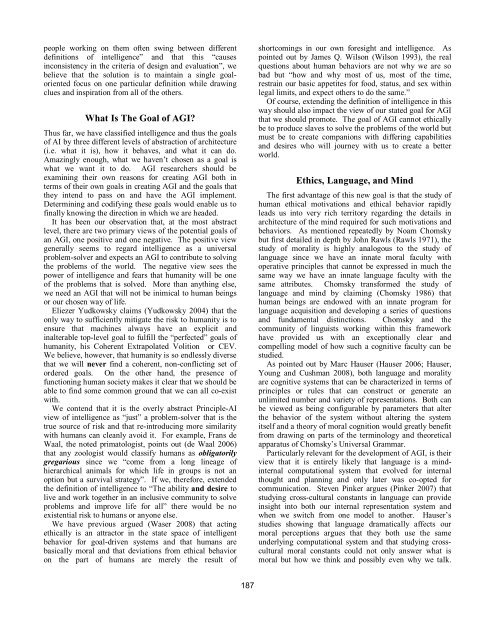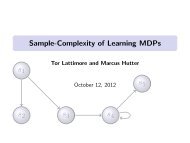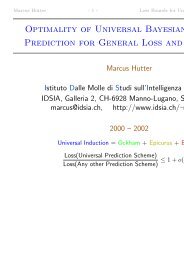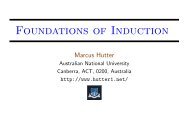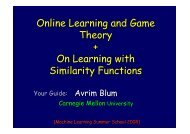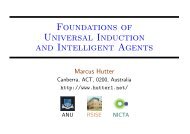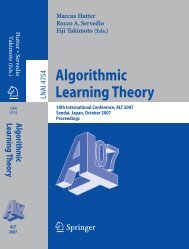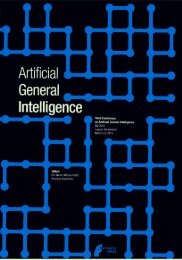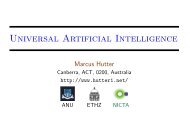A Framework for Evaluating Early-Stage Human - of Marcus Hutter
A Framework for Evaluating Early-Stage Human - of Marcus Hutter
A Framework for Evaluating Early-Stage Human - of Marcus Hutter
Create successful ePaper yourself
Turn your PDF publications into a flip-book with our unique Google optimized e-Paper software.
people working on them <strong>of</strong>ten swing between different<br />
definitions <strong>of</strong> intelligence” and that this “causes<br />
inconsistency in the criteria <strong>of</strong> design and evaluation”, we<br />
believe that the solution is to maintain a single goaloriented<br />
focus on one particular definition while drawing<br />
clues and inspiration from all <strong>of</strong> the others.<br />
What Is The Goal <strong>of</strong> AGI?<br />
Thus far, we have classified intelligence and thus the goals<br />
<strong>of</strong> AI by three different levels <strong>of</strong> abstraction <strong>of</strong> architecture<br />
(i.e. what it is), how it behaves, and what it can do.<br />
Amazingly enough, what we haven’t chosen as a goal is<br />
what we want it to do. AGI researchers should be<br />
examining their own reasons <strong>for</strong> creating AGI both in<br />
terms <strong>of</strong> their own goals in creating AGI and the goals that<br />
they intend to pass on and have the AGI implement.<br />
Determining and codifying these goals would enable us to<br />
finally knowing the direction in which we are headed.<br />
It has been our observation that, at the most abstract<br />
level, there are two primary views <strong>of</strong> the potential goals <strong>of</strong><br />
an AGI, one positive and one negative. The positive view<br />
generally seems to regard intelligence as a universal<br />
problem-solver and expects an AGI to contribute to solving<br />
the problems <strong>of</strong> the world. The negative view sees the<br />
power <strong>of</strong> intelligence and fears that humanity will be one<br />
<strong>of</strong> the problems that is solved. More than anything else,<br />
we need an AGI that will not be inimical to human beings<br />
or our chosen way <strong>of</strong> life.<br />
Eliezer Yudkowsky claims (Yudkowsky 2004) that the<br />
only way to sufficiently mitigate the risk to humanity is to<br />
ensure that machines always have an explicit and<br />
inalterable top-level goal to fulfill the “perfected” goals <strong>of</strong><br />
humanity, his Coherent Extrapolated Volition or CEV.<br />
We believe, however, that humanity is so endlessly diverse<br />
that we will never find a coherent, non-conflicting set <strong>of</strong><br />
ordered goals. On the other hand, the presence <strong>of</strong><br />
functioning human society makes it clear that we should be<br />
able to find some common ground that we can all co-exist<br />
with.<br />
We contend that it is the overly abstract Principle-AI<br />
view <strong>of</strong> intelligence as “just” a problem-solver that is the<br />
true source <strong>of</strong> risk and that re-introducing more similarity<br />
with humans can cleanly avoid it. For example, Frans de<br />
Waal, the noted primatologist, points out (de Waal 2006)<br />
that any zoologist would classify humans as obligatorily<br />
gregarious since we “come from a long lineage <strong>of</strong><br />
hierarchical animals <strong>for</strong> which life in groups is not an<br />
option but a survival strategy”. If we, there<strong>for</strong>e, extended<br />
the definition <strong>of</strong> intelligence to “The ability and desire to<br />
live and work together in an inclusive community to solve<br />
problems and improve life <strong>for</strong> all” there would be no<br />
existential risk to humans or anyone else.<br />
We have previous argued (Waser 2008) that acting<br />
ethically is an attractor in the state space <strong>of</strong> intelligent<br />
behavior <strong>for</strong> goal-driven systems and that humans are<br />
basically moral and that deviations from ethical behavior<br />
on the part <strong>of</strong> humans are merely the result <strong>of</strong><br />
187<br />
shortcomings in our own <strong>for</strong>esight and intelligence. As<br />
pointed out by James Q. Wilson (Wilson 1993), the real<br />
questions about human behaviors are not why we are so<br />
bad but “how and why most <strong>of</strong> us, most <strong>of</strong> the time,<br />
restrain our basic appetites <strong>for</strong> food, status, and sex within<br />
legal limits, and expect others to do the same.”<br />
Of course, extending the definition <strong>of</strong> intelligence in this<br />
way should also impact the view <strong>of</strong> our stated goal <strong>for</strong> AGI<br />
that we should promote. The goal <strong>of</strong> AGI cannot ethically<br />
be to produce slaves to solve the problems <strong>of</strong> the world but<br />
must be to create companions with differing capabilities<br />
and desires who will journey with us to create a better<br />
world.<br />
Ethics, Language, and Mind<br />
The first advantage <strong>of</strong> this new goal is that the study <strong>of</strong><br />
human ethical motivations and ethical behavior rapidly<br />
leads us into very rich territory regarding the details in<br />
architecture <strong>of</strong> the mind required <strong>for</strong> such motivations and<br />
behaviors. As mentioned repeatedly by Noam Chomsky<br />
but first detailed in depth by John Rawls (Rawls 1971), the<br />
study <strong>of</strong> morality is highly analogous to the study <strong>of</strong><br />
language since we have an innate moral faculty with<br />
operative principles that cannot be expressed in much the<br />
same way we have an innate language faculty with the<br />
same attributes. Chomsky trans<strong>for</strong>med the study <strong>of</strong><br />
language and mind by claiming (Chomsky 1986) that<br />
human beings are endowed with an innate program <strong>for</strong><br />
language acquisition and developing a series <strong>of</strong> questions<br />
and fundamental distinctions. Chomsky and the<br />
community <strong>of</strong> linguists working within this framework<br />
have provided us with an exceptionally clear and<br />
compelling model <strong>of</strong> how such a cognitive faculty can be<br />
studied.<br />
As pointed out by Marc Hauser (Hauser 2006; Hauser,<br />
Young and Cushman 2008), both language and morality<br />
are cognitive systems that can be characterized in terms <strong>of</strong><br />
principles or rules that can construct or generate an<br />
unlimited number and variety <strong>of</strong> representations. Both can<br />
be viewed as being configurable by parameters that alter<br />
the behavior <strong>of</strong> the system without altering the system<br />
itself and a theory <strong>of</strong> moral cognition would greatly benefit<br />
from drawing on parts <strong>of</strong> the terminology and theoretical<br />
apparatus <strong>of</strong> Chomsky’s Universal Grammar.<br />
Particularly relevant <strong>for</strong> the development <strong>of</strong> AGI, is their<br />
view that it is entirely likely that language is a mindinternal<br />
computational system that evolved <strong>for</strong> internal<br />
thought and planning and only later was co-opted <strong>for</strong><br />
communication. Steven Pinker argues (Pinker 2007) that<br />
studying cross-cultural constants in language can provide<br />
insight into both our internal representation system and<br />
when we switch from one model to another. Hauser’s<br />
studies showing that language dramatically affects our<br />
moral perceptions argues that they both use the same<br />
underlying computational system and that studying crosscultural<br />
moral constants could not only answer what is<br />
moral but how we think and possibly even why we talk.


